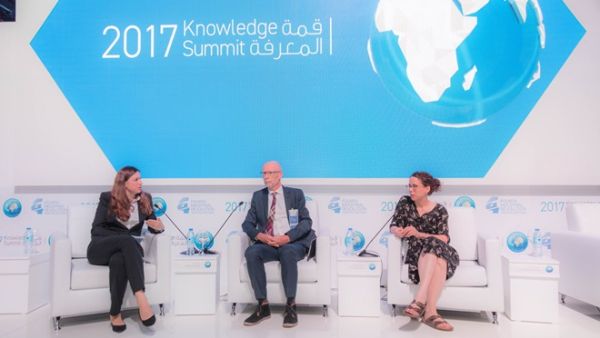Knowledge Summit 2017 Explores Impact of Fourth Industrial Revolution on the Future of Content Creation

The Knowledge Summit 2017 explored the impacts of the Fourth Industrial Revolution on the media and content business in a session titled “The Future of Creating Content”, moderated by Frankfurt Book Fair Director Jürgen Boos and featuring Stephanie Duncan, Digital Media Director at prominent publisher Bloomsbury, and Marta Piekarska, Director of Ecosystem at tech firm Hyperledger.
“Books have been around for a long time,” Stephanie Duncan said, “the invention of printing and publishing made knowledge available to the masses. One of the greatest additions brought about by the Fourth Industrial Revolution and the digital revolution is that it enabled self-publishing for the general public, which was only feasible for an elite few in the past. This does bring forth a set of potential complications such as rights complexities, determining who gets paid for what, etc.”
“Another challenge is how to choose the right information from the massive data available in the digital sphere,” Duncan continued. “In this regard, curation is key, and this is where I believe Blockchain can bring great solutions. While I don’t believe Blockchain will change the way we write books, the technology has also provided a great deal of benefits, where it has allowed us to share our contents with readers, ensure that our authors get paid and make sure books are authentic and not copies.”
The session delved deep into the future of media and content, including multichannel, multimedia, multilingual and multinational content, as well as creative artificial intelligence, asking if the smart machine is the “next genius”. Moreover, the experts looked into Blockchain technology and how it could disrupt the industry – positively or negatively.
“On the internet, everyone shares their own version of the truth,” said Marta Piekarska, “and this is what prompted experts to start looking for ways to build a consensus on what is the actual verifiable truth. And this is essentially how Blockchain came to be: the technology consists of integrated systems that allow any changes made to be reflected for all stakeholders to see, thus ensuring trust and transparency.”
As for how it relates to knowledge, Piekarska cited as examples universities, governments and other institutions using Blockchain for accreditation and certification purposes, in addition to copyright preservation. “We are already building solutions that allow us to preserve the rights of content creators,” she asserted, noting that the younger generations, who grew up with the internet seem to be more willing to pay for the services they receive online.
“Blockchain is a peer-to-peer system, therefore, as the name suggests, you need peers. This is why we always encourage collaboration among organisations that are looking to benefit from the technology,” Piekarska concluded.
The Mohammed bin Rashid Al Maktoum Knowledge Foundation (MBRF) holds this fourth edition of the Knowledge Summit at the Dubai World Trade Centre on November 21-22, 2017, under the theme “Knowledge and Fourth Industrial Revolution.” The Summit is organised under the patronage of His Highness Sheikh Mohammed bin Rashid Al Maktoum, Vice President and Prime Minister of the UAE, Ruler of Dubai, and the directives of MBRF Chairman H.H. Sheikh Ahmed bin Mohammed bin Rashid Al Maktoum.
Background Information
Mohammed Bin Rashid Al Maktoum Foundation
Launched by His Highness Sheikh Mohammed Bin Rashid Al Maktoum, Vice-President and Prime Minister of the UAE and Ruler of Dubai in May 2007, the Mohammed bin Rashid Al Maktoum Knowledge Foundation has since led and implemented pioneering programmes aimed at establishing Dubai and the UAE as the centre for knowledge and research.
MBRF aims to empower future generations and enable them to devise sustainable solutions to facilitate the process of knowledge and research in the Arab World. The Foundation is committed to create knowledge-based societies throughout the region by funding research projects, activities, and initiatives. It nurtures ideas and innovation while focusing on its main pillars which are education, entrepreneurship, and research & development.






